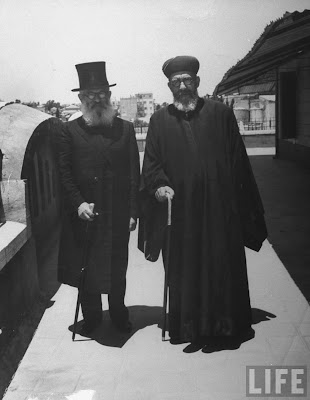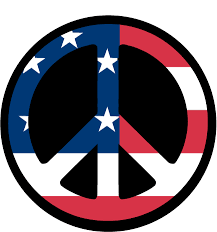Sefer Am Ve-Artzo vol. 1, #11]
Question: The Torah scholars and great authorities of Israel who support the position of Gush Emunim (the movement to settle all of the historical Land of Israel) are the minority of Rabbis in contrast to those who are opposed. If so, shouldn't we follow the general principle of Jewish Law that majority rules?
Answer: I will deal with the essence of the question without discussing whether it is in fact the reality. After all, our Rabbi, Ha-Rav Tzvi Yehudah, was well known for his declaration that the majority of the world’s Torah giants did not oppose Zionism. Once, one of the students at the Yeshivah said that he would not dare make such a statement in the vicinity of the Holy Ark. The student’s words made their way to the ears of our Rabbi. Our Rabbi immediately ran to the Yeshiva, opened up the Holy Ark containing the Torah Scrolls and said, "Whoever says that the majority of Torah giants opposed Zionism is a liar. The truth should be told that Zionism was a new movement, and most of the leading Rabbis were uncertain as to how to relate to it. Most of those who did take a stand were actually in favor of Zionism."
The halachic authorities have written that the principle that we follow the majority only applies if all authorities sit together and there is give-and-take between them, and not if each one of them states his opinion on his own and we count up their opinions. Since perhaps, if the majority heard the opinion of the minority and had give-and-take with them, they would be convinced (Shut Ha-Rashba quoted in Beit Yosef, Choshen Mishpat, end of chap. 13). "Because we do not say majority rules except when a majority of them argue face-to-face" (Sedei Chemed, vol. 3, pg. 149), "When all of the judges are gathered together in one place like the Sanhedrin" (Get Pashut, kelali, klal #1, and see Shut She’eilat David in Makor Beit Av – ma’amar #2, Mishnat Hora’ah by Mahartz Chayot chap. 4-5, Sdei Chemed – kelalim ma’arechet yud klal #35, Minchat Chinuch, mitzvah 78 #1 and Chazon Ish – Kilayim siman 1).
Despite this idea, the authorities mention the issue of deciding based on "the majority of wisdom" (i.e. greater knowledge and expertise in a particular area of Halachah), and there are even those who say that we follow a "majority of wisdom" over a "majority of number" (Likutei Ha-Ramban, Sanhedrin chap. 4 in the name of the Rahag). One must distinguish between "the majority of wisdom" for each authority based on his area of expertise: there are Rabbis whose expertise is monetary laws, and there are Rabbis whose expertise is in Kashrut, etc… Maran Ha-Rav Avraham Yitzhak Ha-Cohain Kook's expertise was in the area of the workings of Klal Yisrael relating the rebuilding of our Nation and our Land, the beginning of the Redemption and in understanding the Master of the Universe’s direction of our history. He investigated, clarified, arranged, and constructed a complete method of understanding, whose scope and depth is far above all of the Sages of the generation of Acharonim (later authorities).
For example, Ha-Rav Joseph Soloveitchik, with all of his brilliance, did not construct an all-compassing method of understanding, and all of his teachings were, in essence, about the phenomenon of the religious individual. He did not present a philosophy of communal faith: The Rav only discussed the religious experience of the individual as opposed to the communal religious experience which includes understanding Hashem's role is guiding the history of the Nation of Israel.
All that was said above is equally applicable in relation to students who did not sufficiently learn Torah, and came to create all sorts of lies about Maran Ha-Rav Kook. They forged documents in his name, and placed in his mouth the opposite of what he said. The proper way to understand his teachings is through his son, our Rabbi, Ha-Rav Tzvi Yehudah, who even in his youth, his father said of him, "…with gratitude of G-d, he is nearly one with me, he who is accustomed to remain faithful to my opinion and hears the conversation of my soul (Igrot Ha-Re’eiyah vol. 1, p. 121).
Based on the decisions of Rabbi Akiva, in matter of the Messianism of Bar Kochba, the Rambam ruled, "He and all the Sages of his generation considered him to be the Messianic King" (Rambam, Hilchot Melachim 11:3), even though we find Sages who disagreed with his position (Sanhedrin 93b and see Jerusalem Talmud Ta’anit 4:5, Eichah Rabbah 2:2). How then did the Rambam write: "Rabbi Akiva and all the Sages of his generation"? Rather it was clear to him, that in all matters pertaining to the vision of Redemption and the resurrection of Israel and its Land, Rabbi Akiva was the expert; that is, he possessed "the majority of wisdom." Therefore, even though the majority disagreed with him, he was defined by Halachah as "all the Sages of his generation" (see Rambam, Hilchot Ta’anit 5:3 where there is a similar understanding.
[Source: http://www.ravaviner.com/2010/02/minority-and-majority-opinion.html]
Also see the following by the controversial, but articulate and intelligent R'Dovid Bar Chaim of Machon Shilo (
http://www.machonshilo.org/ )
During a student's first years in yeshiva he learns to think creatively and ask probing questions. However, when he embarks on his rabbinical studies, the rules change. Suddenly all that is a thing of the past. Now he is taught not to think, for his opinion is not important; he is now taught that he must simply accept. This approach, a far cry from the methodology of the Talmud, produces "rabbis" incapable of analyzing primary sources and reaching an independent conclusion. One tragic example is child abuse within the observant community.
Download Part 1
Download Part 2


 This coming Thursday (24th Decemeber 2009) I am flying to the holy land for my very first time, Thank G-d. It is a special privilege and honour that I have been given, which I am very grateful for. I will be there until the 22nd of January.
This coming Thursday (24th Decemeber 2009) I am flying to the holy land for my very first time, Thank G-d. It is a special privilege and honour that I have been given, which I am very grateful for. I will be there until the 22nd of January.





 Orthodox Jews & African American’s Picnic Together At Crown Heights Unity Fair
Orthodox Jews & African American’s Picnic Together At Crown Heights Unity Fair